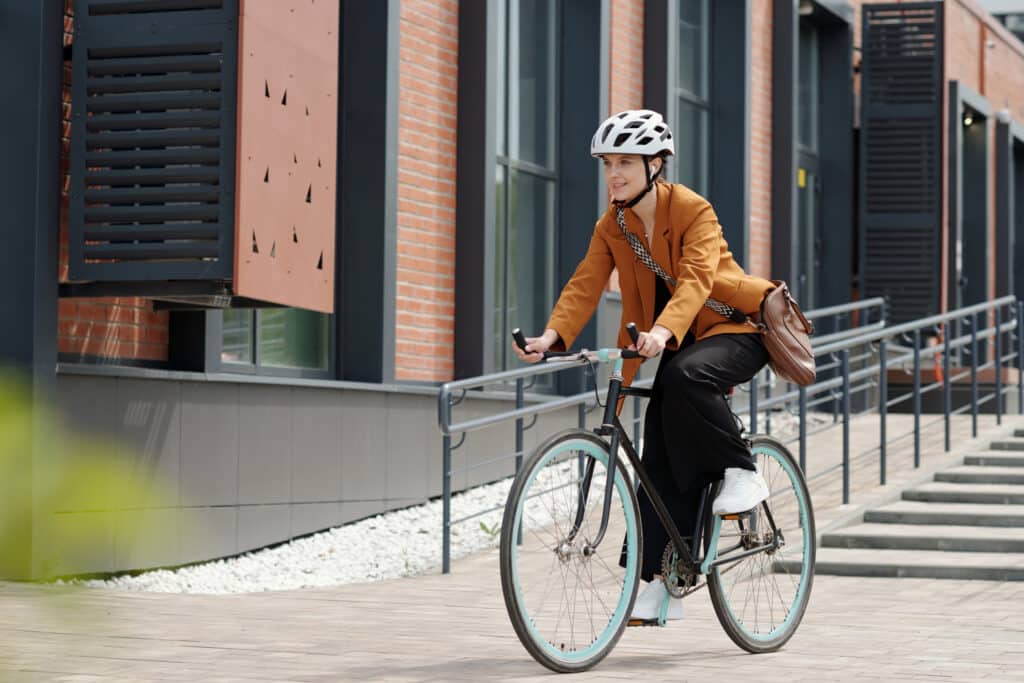Preparing for reentry
Workforce, corrections agencies seek to engage employers to hire ex-offenders

JOE GARDYASZ Jan 9, 2020 | 5:42 pm
9 min read time
2,171 wordsBusiness Record Insider, Economic Development
Take away the 20-foot-high chain-link fence and concertina wire, and the Iowa Correctional Institute for Women might be mistaken for a slightly dated corporate campus, or perhaps the commons area of a community college. But the razor-sharp wire surrounding it all is a constant reminder that you’re within a prison complex.
I recently joined a group of Central Iowa employers for a visit to the Iowa Correctional Institution for Women (ICIW) near Mitchellville. State officials are hopeful that getting employers out to the prisons and familiar with reentry programs that are available will encourage businesses to consider ex-offenders as a viable option for addressing Iowa’s workforce shortage.
“I think it’s fair to say that being here pushes you to the edge of your comfort zone,” Gov. Kim Reynolds said as she greeted about 100 business and community leaders. “But outside the comfort zone is where growth occurs.”
Each year between 5,000 and 6,000 inmates are released from Iowa’s nine correctional institutions — and face considerable hurdles to find employment and avoid returning to prison. Those individuals represent a potential labor and talent source that Iowa can tap, particularly given its low unemployment rate, officials say.
“We have made a lot of progress on criminal justice reform, and we plan on doing a lot more this legislative session,” Reynolds told employers. “At a time when we have a workforce shortage, this is the time to help ex-offenders get back on track. And for the most part, ex-offenders are looking to get back on track.”
The employers gathered in a large meeting space just inside the institution’s electronic steel doors, which would occasionally open and then slowly roll shut with a clang, an intermittent reminder of their surroundings.
The Mitchellville event was the first of six planned reentry roundtable events planned by the Iowa Department of Corrections and the Iowa Department of Workforce Development.
“You are a key piece to their successful reentry,” Iowa Workforce Development Director Beth Townsend said. The agencies have been working together in an effort to improve ex-offenders’ post-release outcomes, inform employers about available programs and educate Iowans about the barriers that returning felons face.
“The Iowa Corrections team, along with our government, nonprofit and community college partners, has put a tremendous amount of work into transforming incarcerated people into the type of worker that an employer would like to have,” said Beth Skinner, director of Iowa DOC. “Many of these returning citizens are job site-ready. We want to make sure that as employers are looking to fill their labor needs, they consider this population for their workforce.”
Some Iowa employers are just getting started with hiring ex-offenders, while others have had more experience with it. A common theme among three employers who told their stories: They got started after hearing about successful programs in other states.
Randy Van Dyke, CEO of Iowa Lakes Regional Water District in Spencer, said he and other leaders from his organization attended a national conference in San Francisco where they heard about other water districts that had successfully instituted ex-offender hiring programs. The regional water district serves 11 water and wastewater systems in southwest Minnesota and northwest Iowa.
“I was rather shocked and amazed by their enthusiasm for it,” Van Dyke said. “And I didn’t see a lot of downside. So I asked what’s going on in Iowa, and we began looking at what we could do in Spencer.” Over the past year, the organization has hired three ex-offenders.
Van Dyke said that potential negative reactions he anticipated in the community never materialized. Rather, “we often hear, ‘Way to go,’” he said.
Transportation is the biggest hurdle that the water district has encountered, because the process of reestablishing driving privileges can be time-consuming. “A ride program in Spencer gets them to and from work, but driving on the job is where the bottleneck is right now,” Van Dyke said.
Iowa’s construction industry is also taking a closer look at how it can employ more ex-offenders. Andres Rodriguez, director of safety with Slater-based Absolute Group, was among the employers who attended the recent reentry roundtable event at ICIW.
Absolute Group, which operates five road construction companies with about 400 workers across the state, to date has hired five ex-offenders, several of them out of federal prisons, Rodriguez said. “One of those guys is one of our top performers,” he said. At the time of the prison visit, Absolute Group had about 30 positions open, “and in April-May that’s going to skyrocket,” he said.
Another employer, Frontier Natural Products, has hired about 30 ex-offenders across its five organic food production facilities across the state. That company addressed the transportation issue by purchasing a van, with which they charge employees $5 per day for rides, said Tony Bedard, the cooperative’s CEO. “We actually make it available to all our employees,” he said.
Bedard said he attended a prison program in Omaha and was impressed with how well many of the inmates presented themselves.
He initially hired one ex-offender out of the Anamosa State Penitentiary, and based on a favorable experience hired six more workers during a Second Chance Job Fair hosted by the Iowa DOC. To help the workers keep on track, the company brings a counselor out to the worksite to follow up with each ex-offender. “Our ratio of good employees that we get out of that program is as good as we get from temp agencies,” he said.
Apprenticeships are one route that the Iowa Department of Corrections and Iowa Workforce Development are collaborating on to increase opportunities for reentry.
Dane Sulentic, director of DOC’s apprenticeship program, said that 320 inmates are currently enrolled in 26 registered apprenticeships offered. So far, 210 individuals have completed apprenticeships. ICIW has seven apprenticeship programs for its women inmates, with an average of about 20 participants at any time.
“Every one of our programs has a community college partner,” Sulentic said.
“We are always looking for the opportunity to add more [apprenticeship] positions. The individuals who have visited the facilities really understand the process and the barriers that [ex-offenders] face.”
In January, Diamond Crystal in Mitchellville plans to begin hiring inmates for positions at its plant, which is within walking distance of the prison. The program, a partnership with Iowa Prison Industries, will enable minimum-security inmates who live outside of the prison to walk daily to their jobs. The company hopes to begin hiring in January and plans to fill five positions initially.
Regional nonprofit organizations are also finding ways to spur more training to provide individuals with more skills before they’re released. In August, NewBoCo, a Cedar Rapids-based nonprofit, launched DeltaV Code School computer coding classes for the female inmates at Mitchellville. The 20-week program, which trains people for employment as JavaScript developers, was funded by a $175,000 grant from Google.
Furthering their education gives the women “a completely different mindset — it creates a completely different person,” said Sheryl Dahm, the warden at the Iowa Correctional Institute for Women.
Because most women who are incarcerated have experienced some degree of trauma, “the pathway for women in prison is a lot different than for men,” Dahm said while conducting a tour of ICIW for the employers. “It’s really about having the safety to see who you are,” she said. “We really try to look at each pathway to help them.”
Dahm credited Reynolds’ leadership for creating more awareness in the past two years.
“It’s gaining momentum, which is what we need,” she said after employers had departed. “Just having the employers come here to meet the women makes a big difference. I think with women specifically, we have a big responsibility to step outside of the box — to do more introductions and have more face time.
“I’ve been working in corrections for 30 years, and I would say this is the most proactive leadership that I’ve seen. I’m glad that I’m warden at this time.”
“I guess they see the potential in me.”
United Way program provides employment gateway for former inmates
After dropping out of college, getting involved with the wrong crowd and making some bad choices, Sabreen Al-Hameed ended up being incarcerated at the Iowa Correctional Institute for Women.
“I thought it was the worst thing that could happen, but actually it was the best thing,” said Al-Hameed, who, less than a year after getting out of prison, recently began working at United Way of Central Iowa’s Des Moines office.
Al-Hameed, 27, is one of more than 100 ex-offenders enrolled in Central Iowa Returning Citizens Achieve (CIRCA), a pilot program led by United Way aimed at providing better education and support for former inmates reentering the workforce.
In June 2018, United Way of Central Iowa received a $1.5 million grant from the U.S. Department of Labor that it’s using to provide job training and case managers to inmates at the Newton Correctional Institute and the women’s prison in Mitchellville. The program also works with two work-release centers in Des Moines — Fresh Start Women’s Center and Fort Des Moines Community Correction Center.
After they’re released, participants in the program receive help with their job search as well as with paying for transportation and housing while they get established in the community. The project aims to assist nearly 200 ex-offenders, with a goal of securing employment for 75% of participants, and for fewer than 20% to return to prison. The overall recidivism rate for ex-offenders in Iowa is 38%.
The grant funding provides for serving 188 ex-offenders with training, job placement and support. About midway through the grant period, 118 individuals have completed the seven-week training, which represents an 86% completion rate so far. About 70% of those who have been released from prison have found jobs.
“The challenge is finding employers with good jobs,” said Pat Steele, director of Central Iowa Works, the United Way program that oversees CIRCA. “Just like any population that has what employers could see as a barrier, individuals with criminal history are often given the lowest-paying jobs. And they can’t support their families at $10 an hour.
“We’re trying to encourage employers to give them a chance in the jobs that are a little bit higher skill or that pay a little bit more,” he said. “I think one of the perceptions of the community has is that the people that are incarcerated aren’t smart, and that’s why they’re incarcerated. That’s not at all true.”
Among the dozens of Central Iowa companies that are participating in CIRCA, Michael’s Foods in Norwalk has been particularly receptive to working with ex-offenders, said Amber Ramirez, CIRCA’s program manager.
“They’re opening this big facility, and they’re not on a bus line,” she said. “So they’ve had to do a lot of creative thinking in order to find employees. We’ve found that they’re willing to look at our participants because we have case managers that were working with them all along. And that helped them with issues that come up. So it’s really less risky to hire one of our participants than just someone off the street who isn’t necessarily working with anyone.”
Iowans with felony convictions face multiple hurdles in getting integrated back into the community. Driving restrictions are among the biggest barriers, as ex-offenders can face a lengthy process in getting back their license and being allowed to drive, Ramirez said.
“I feel like it should be a faster process for them to be able to drive again, because they’re expected to get a job,” Ramirez said. “That’s why a lot of people get a lower-paying job is because they’re required to work if they’re in any sort of parole. So they’ll take the first job that comes along, even if they have the skills to do a better job.”
Another issue that’s been surprising to the counselors is the high amount of court-related debt that people have coming out of prison — on average about $18,000 — with at least half that being county jail fees that accrued daily as they were awaiting trial.
Some state legislatures have addressed this issue by reducing or forgiving this debt, Steele said. He said he would favor an incentive-based program in which a portion of debt is forgiven after an ex-offender has made consistent payments for a few years.
During the seven months she was in prison, Al-Hameed completed a certificate program in transportation, distribution and logistics through Des Moines Area Community College, which led to her being hired by a logistics company in Des Moines. She worked there for six months before an opportunity came up to work at United Way.
“I guess they see the potential in me,” Al-Hameed said of her new job at United Way, which is actually two part-time positions — community resource specialist for the 2-1-1 program, and administrative assistant for Central Iowa Works. Eventually, she hopes to return to college for training in human resources and get involved in some type of outreach work, she said.
“They’re giving me a chance to get some experience.”











